18 Types Of Burgers Around The World
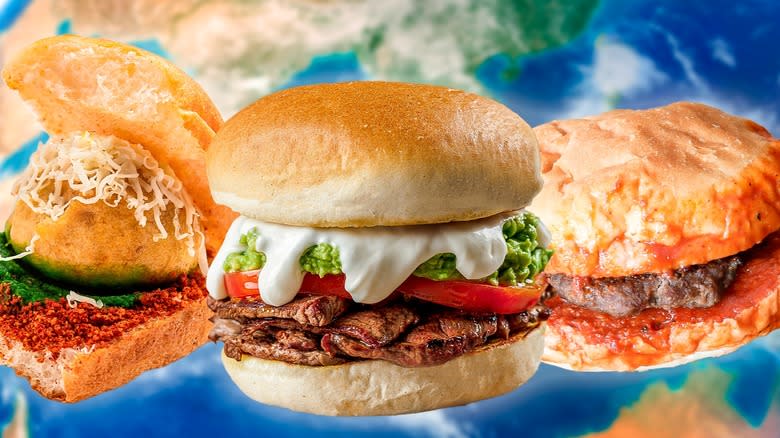
Globalization comes with a lot of drawbacks. Jobs get displaced, endangered languages are lost, and viruses with pandemic potential spread with ease. But for all the downsides, there's at least one positive aspect of our increasingly interconnected world: the opportunity for dishes to traverse borders. Consider burgers, for instance. What started as a meatball squished between two pieces of bread in the late 19th century has become a beloved meal in almost every country on the planet.
Not only that, but burgers have evolved at every stop, soaking up local flavors and culinary styles. Some variations, like Finland's reindeer burger and China's donkey burger, play with the meat itself. Others, like Japan's rice burger, bring in unique substitutes for traditional bread. These burgers may look and taste different from what you're used to, but they're delicious in lots of other ways. If we've piqued your interest, get ready to discover 18 types of burgers from around the world.
Read more: 25 Most Popular Snacks In America Ranked Worst To Best
Reindeer Burger

Finland, often associated with stereotypes about introversion and a fondness for saunas, has also earned a reputation for its unconventional burgers. One notable example involves burgers crafted from reindeer meat. While the idea might not immediately appeal to those outside of the Arctic Circle, reindeer meat has long been a dietary staple for the Sami, the indigenous people of Norway, Sweden, Finland, and Russia's Kola Peninsula.
The meat may be novel, but reindeer burgers bear a striking resemblance to the familiar all-beef patties. The meat is ground into patties, which are then served on a soft bun and topped with cheese, typically gouda or Jarlsberg. The pièce de résistance, however, is the lingonberry jam. Similar to cranberries and a common sight in Scandinavian cuisine, these slightly tart berries add a unique and flavorful element to the reindeer burger experience.
Islak Burger
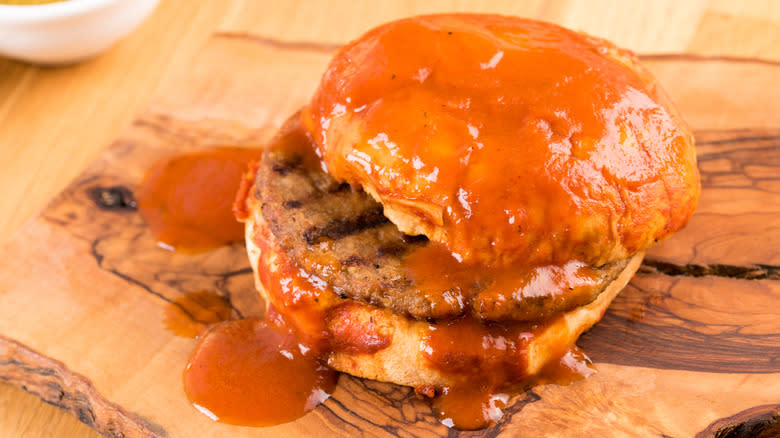
The name islak, meaning "wet" in Turkish, aptly describes the saucy, moist nature of these burgers, a street food staple in Turkey. Preparation involves grilling ultra-thin beef patties seasoned with garlic and black pepper. Midway through cooking, the patties are topped with a single bun that's generously slathered inside and out with slightly spicy tomato sauce. The second bun completes the ensemble and receives an additional coating of the delectable sauce on both sides. The finished burgers are then stored in a steamer box, awaiting eager buyers.
Legend has it that these messy delights originated in the 1960s or 1970s at Kristal Buffet in Taksim Square, a busy area of Istanbul. Today, Islak burgers have transcended their birthplace and can be found throughout the country, gaining popularity as a favored late-night snack, especially among those seeking a satisfying treat after a night out.
Hamburguesas Mexicanas

You might have sampled Mexican-inspired burgers at restaurants before and found they share a likeness to the American approach. Indeed, the Mexican version is similar in many ways: It begins with a ground beef patty, often seasoned with onion and garlic for added flavor. However, after cooking, the patties are adorned with classic Mexican elements such as guacamole, pico de gallo, jalape?o, and chili peppers. These add-ons are complemented by cheese, lettuce, and tomato.
Depending on the specific recipe, you might find an extra protein source like ham, bacon, chorizo, or perhaps a dollop of refried beans to enhance the experience. While the basic structure aligns with familiar burger traditions, the infusion of authentic Mexican ingredients provides a delightful twist to the taste buds.
Ramly Burger
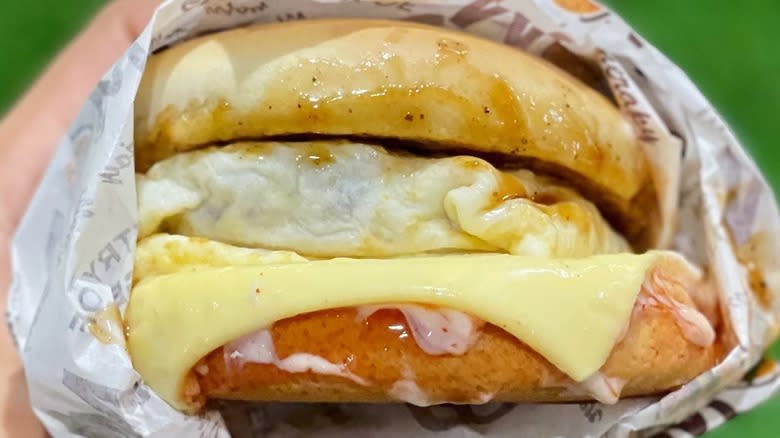
Hailing from Malaysia, the Ramly burger takes its name from Haji Ramly Mokni, the visionary behind the patty. Mokni's ambition to create halal burger meat for Malay people began as a modest home-based venture in 1978 and has now evolved into a multimillion-dollar enterprise. The journey to success involved rejection and recipe tweaking, but now it's impossible to imagine the Malaysian culinary scene without these iconic burgers. Ramly burgers feature a beef or chicken patty wrapped in an omelet and topped with shredded cabbage, mayonnaise, cucumber, Worcestershire sauce, chili sauce, and Maggi — a flavorful seasoning made from fermented wheat.
It's worth noting that the term Ramly has expanded beyond its original association with the Ramly company's beef patties. Now used by various food stalls, it refers to burgers made with similar ingredients, showcasing the widespread influence of this unique culinary creation.
Bun Kebab
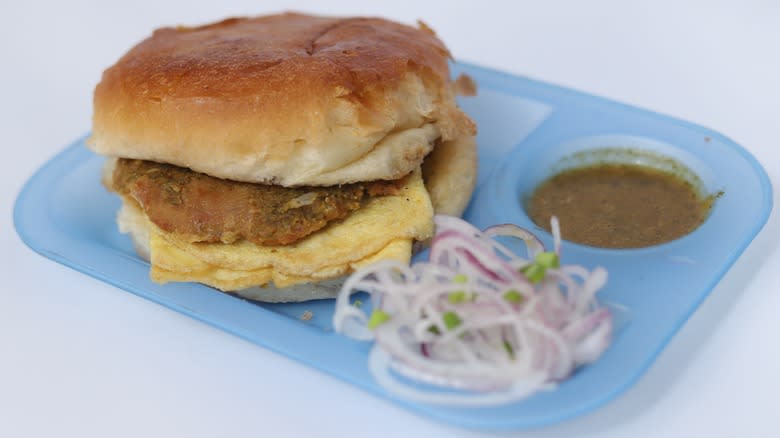
Bun kebab is also called anda shami, where "anda" translates to "egg," and "shami" denotes a traditional Pakistani patty utilizing a blend of ground beef, lentils, and spices. It's a beloved street food in major Pakistani cities like Karachi and Lahore. For all of the vegetarians out there, a patty made from lentils and potatoes provides an equally tasty alternative.
The preparation involves placing a shami patty on a soft bread roll -- a pav. Subsequently, scrambled eggs join the mix, followed by layers of lettuce, sliced tomatoes, and onions. The finishing touch is a choice of chutney, with popular varieties including green chutney made from cilantro and mint or imli chutney crafted from tamarind paste and spices like red chili flakes, cumin, and chaat masala.
Frikadellen
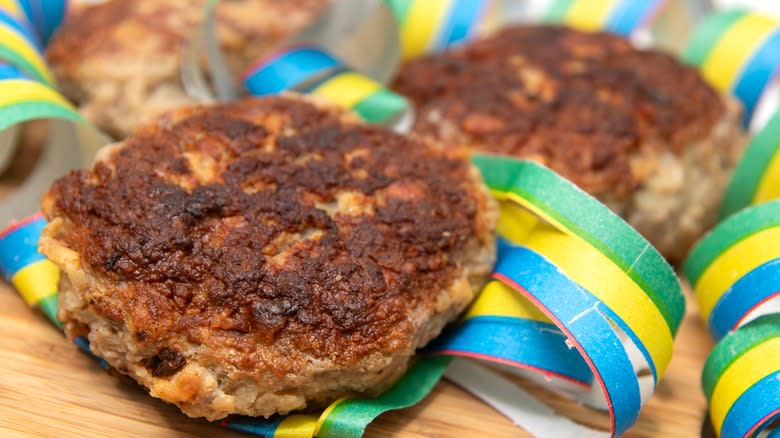
Called frikadellen in Cologne, buletten in Berlin, and fleischküchle in Bavaria, these thick pan-fried patties are popular throughout Germany. They're also a common sight in other Scandinavian countries, as well as in Poland. Recipes differ from region to region and from country to country, but they undeniably served as the precursor to the modern American hamburger.
Frikadellen is created by combining ground beef and pork, freshly made breadcrumbs, egg, garlic, parsley, and a handful of seasonings. Then, they're pan-fried in oil until browned on both sides. Just as the recipes vary, so do the ways to enjoy frikadellen. They can be savored on their own with a side of mustard and potatoes or tucked into a br?tchen, a type of German bread roll. Additionally, they can be served warm or cold, making them a popular dinner or picnic snack.
Vada Pav
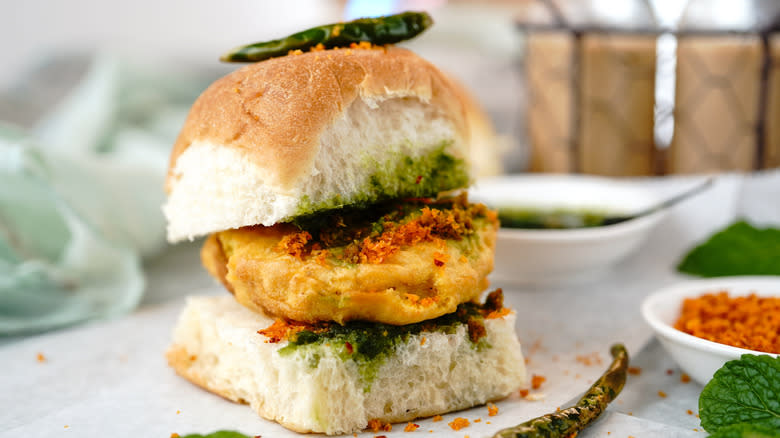
According to World Atlas, an estimated 38% of India's population identifies themselves as vegetarian. So, India seems like an unexpected place to go for a quality burger, but if it hasn't already become clear, a burger is a pretty loose term that refers to any kind of filling snugly nestled in a bread roll. With this modified definition in mind, India's vada pav easily fits the definition.
Vada pavs are buns stuffed with the star of the show: batata vada, a potato dumpling fritter. After deep-frying the dumplings, the pav -- soft and fluffy buns resembling dinner rolls -- are generously slathered with various chutneys: green, sweet, and dry garlic. The fritter takes its place on top, often accompanied by fried salted green chilies, extra chutney, and a piping hot cup of chai. This inventive blend of flavors and textures transforms the traditional concept of a burger into something distinctly Indian.
Chori Burger
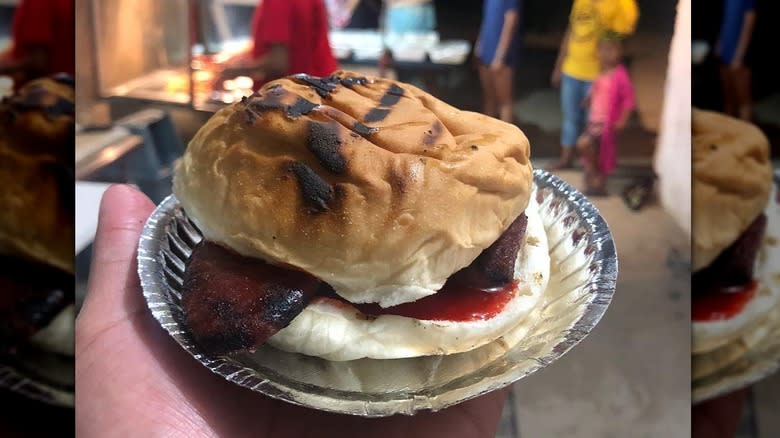
While the Philippines island of Boracay is renowned for its pristine white sand beaches, its chori burgers have also become a major attraction. Created by Merly's BBQ, a humble food stall on the island, this delight has transcended its origins and can now be found throughout the Philippines and even as far as New York City.
Chori is a playful abbreviation for chorizo, offering a glimpse into the burger's distinctive composition. Departing from the usual ground beef, chori burger patties are typically crafted from ground pork or chorizo and seasoned with a blend of garlic, vinegar, and soy sauce before frying. The flavorful meat is then adorned with banana ketchup, mayonnaise, tomatoes, lettuce, and atchara, also known as pickled green papaya. To top it off, a fried sunny-side-up egg is added, resulting in a messy, delicious, and utterly irresistible burger experience.
Aussie Burger With The Lot
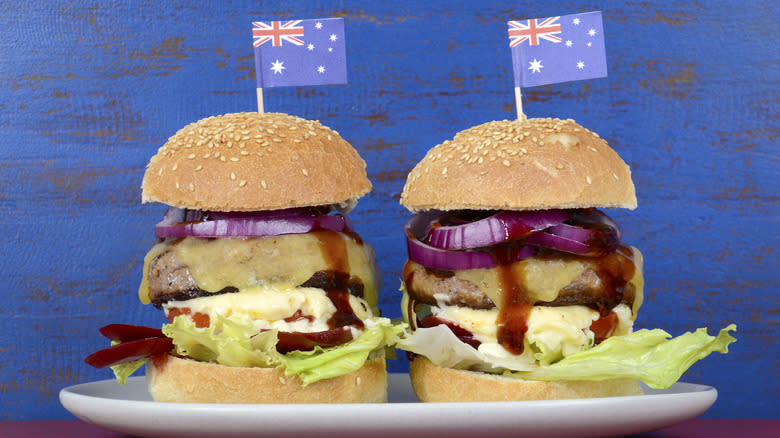
Hold the shrimp: Our barbie -- Australian slang for barbecue -- is reserved exclusively for burgers. Aussie burgers with the lot, to be precise. In Aussie lingo, "with the lot" is the equivalent of "with the works," and that's a pretty accurate description. A true Aussie burger features an all-beef patty that's usually cooked well done, cheddar cheese, smoked streaky bacon, lettuce, and tomato served on a sesame bun, just like their American counterparts. After all, the history of Aussie burgers traces back to American troops stationed down under during World War II.
The intriguing twist comes with the addition of ingredients like a fried egg, canned beetroot, and a ring of canned pineapple. While beetroot might seem unusual, Aussies incorporate this superfood into everything from relishes to burgers. And the pineapple? It adds sweet and slightly sour notes, much like pickles.
Churrasco
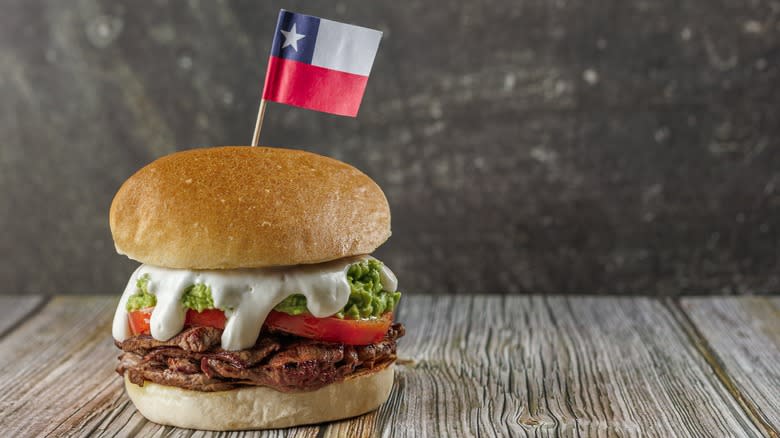
From a distance, churrasco looks remarkably similar to a classic hamburger. There's a hearty bun, some succulent meat, and a variety of veggie toppings. But once you take a closer look, you'll see that this popular Latin American sandwich is in a category all its own. Starting from the top, the bun — usually a marraqueta or pan amasado — should have the texture of a hearty baguette-like roll rather than a soft, fluffy brioche. The meat, known as churrasco, takes the form of thinly sliced grilled beef, resembling a steak more than a patty.
Moving to the toppings, familiar elements like sliced tomatoes, mashed avocado, and mayonnaise share the stage with South American staples like aji (spicy chili sauce), pebre (a Chilean condiment made out of cilantro, onions, and tomatoes), and sauerkraut. Noteworthy variations of this beloved sandwich include chemilico (churrasco with caramelized onions and a sunny-side-up egg) and chacarero (churrasco with tomato and green beans).
Donkey Burger
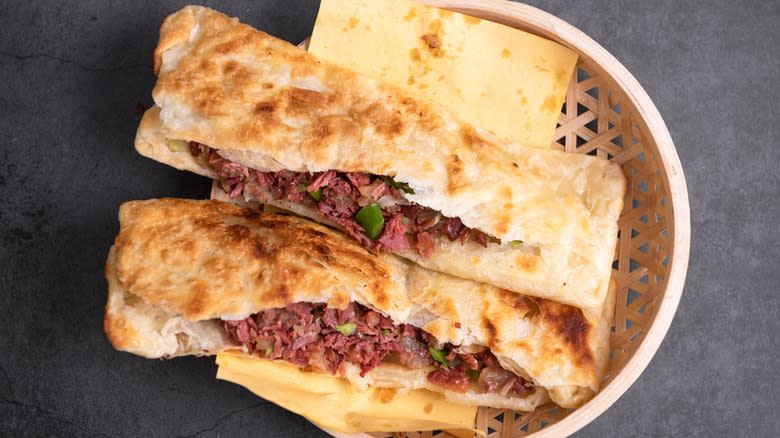
China boasts a diverse array of unique dishes, ranging from fried bee pupae to stinky tofu and beyond. One intriguing addition to this culinary landscape is the donkey burger. What initially began as a delicacy in Hebei Province can now be easily found in major cities throughout China.
Because of its lean, muscular quality, preparing the meat takes time and patience. Or, more accurately, hours of marinating and cooking. Some recipes even incorporate chunks of fat to enhance the flavor. All the work is worth it, as the finished product is gamey and flavorful, with tasting notes similar to beef. Once prepared, the shredded meat is artfully layered onto a warm, flaky flatbread called shao bing. Cilantro and chopped green bell pepper add a refreshing touch, completing this distinctive burger experience.
Kiwiburger
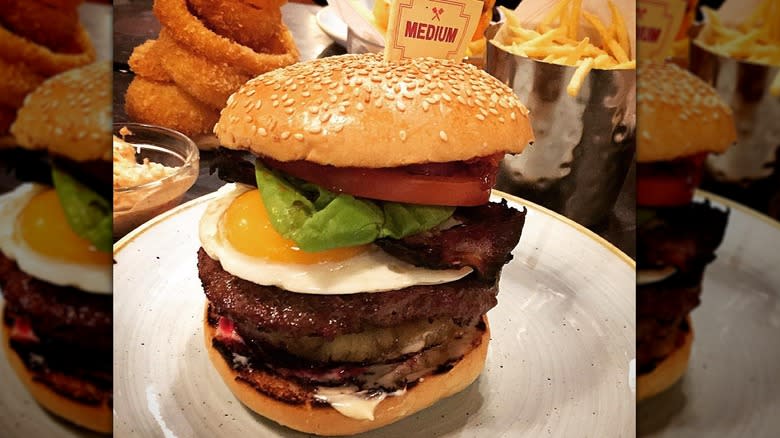
No, this isn't some unique fruit-based burger or a reference to the peculiar, flightless bird that's become New Zealand's national icon. In the context of international burgers, the Kiwiburger is a clever creation of McDonald's New Zealand. Introduced in 1991, this burger incorporates all the usual suspects: a beef patty, lettuce, tomato, cheese, and condiments. What makes it special is the addition of beetroot and griddle egg.
Although beloved by New Zealanders, McDonald's has more of a hot and cold relationship with it. After being introduced in 1991, it stayed on the menu until 2004, when it was discontinued due to the additional costs it presented. The Kiwiburger briefly reappeared in 2008, 2009, and 2011. In 2023, it made yet another comeback. Only time will tell how long it sticks around this time.
Rice Burger
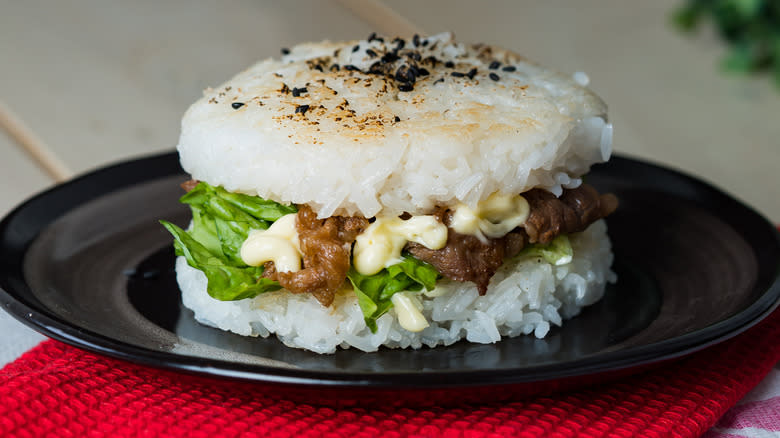
Whether you're steering clear of gluten, have a love for Japanese cuisine, or just want to shake up your regular burger routine, rice burgers are the perfect solution. Created in 1987 by Mos Burger, a Japanese fast-food chain, these burgers replace traditional bread with two grilled or fried rice patties. Inside, a medley of traditional Japanese ingredients awaits.
Take, for example, Mos' yakiniku rice burger or the okonomiyaki rice burger. The latter is a towering creation filled with seafood tempura, okonomiyaki sauce, and bonito flakes. While Japan pioneered rice burgers, they've become a popular snack across East Asia, with each country contributing its local ingredients to these innovative creations. In the past, McDonald's Hong Kong offered a McRice burger that is no longer available.
Lebanese Burger
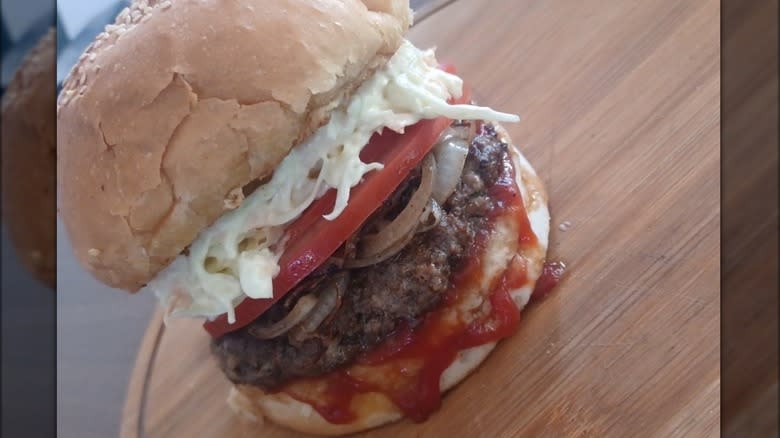
In some instances, burgers incorporate ingredients traditionally found in the nation's cuisine. Take Finland, for example, where burgers are crafted from reindeer meat, a common choice among the Sami people. On the flip side, some burgers take a different route, featuring toppings that have little to do with their national culinary traditions (Australia's beet burgers, we're looking at you).
The Lebanese burger falls into the latter category. Despite Lebanese people loving their burgers, it doesn't quite bring to mind the country's more iconic dishes like falafel or hummus. A classic Lebanese burger consists of a beef patty topped with a generous serving of coleslaw, a handful of fries, tomatoes -- sometimes sautéed, caramelized onions, and a blend of mustard, ketchup, and mayonnaise. It might not be the epitome of Lebanese cuisine, but it sure sounds delicious.
B?fsandwich
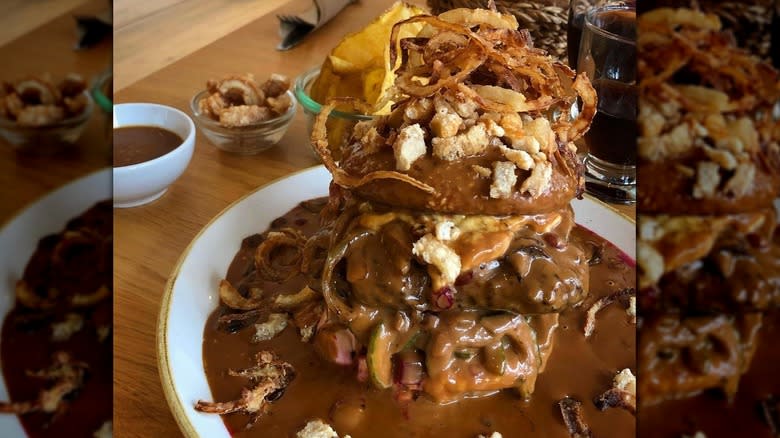
In Danish, b?fsandwich translates to either "steak sandwich" or "beef sandwich." While the translation is accurate, it falls short of conveying the sheer magnitude of the b?fsandwich. Unlike a typical roast beef or steak and cheese sandwich, Denmark's b?fsandwich is a colossal burger that could easily rival Las Vegas' infamous heart attack burger.
It kicks off modestly enough with a minced beef patty on a bun. Then, the toppings escalate. Condiments like brown mustard, ketchup, and remoulade join the party, along with dill pickle chips, slices of pickled beets, and three varieties of onions (diced raw, caramelized, and fried). If that's where it stops, it might have been manageable. But, of course, it goes on. The last step is a generous pour of brown gravy, adding the final flourish to this indulgent burger.
Hot Hamburg Sandwich

Canadians are not only known as some of the nicest people around but also some of the most creative people when it comes to their out-of-the-box dishes. Take poutine, Canada's unofficial national dish, for instance. Its distinctive combination of french fries, cheese curds, and gravy might make you wonder how this idea came about. Though poutine steals the spotlight in the Great White North, it shares similarities with a lesser-known Canadian dish: the hot hamburg sandwich.
As the name suggests, this dish features pan-fried ground beef patties sandwiched between two slices of white bread. After the meat has finished cooking, the drippings mix with a blend of cornstarch and water to create a flavorful gravy. Meanwhile, peas and french fries are prepared. When everything is ready, the sandwich is generously doused with gravy, sprinkled with peas, and served with a side of fries.
Hawaiian Burger
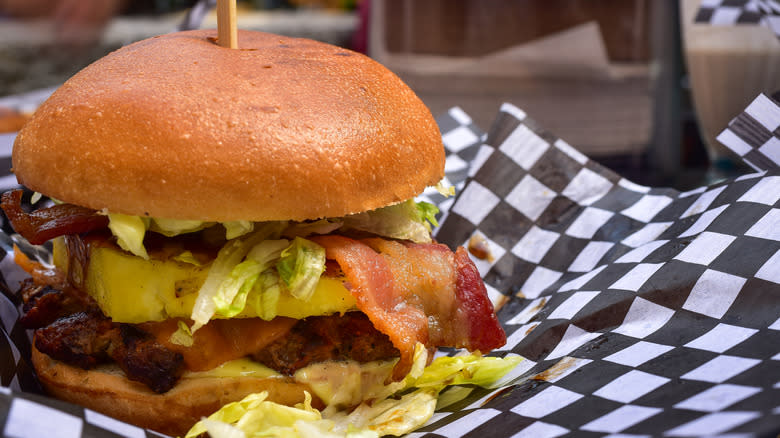
From poke cakes to smoothies, there are all kinds of ways to use canned pineapple. While sweet applications might come to mind first, plenty of savory dishes also benefit from the inclusion of this tropical fruit. Not only does it contain an enzyme that acts as a natural meat tenderizer, but it also adds flavor to blander cuts of meat like pork loin.
With all of that in mind, it makes perfect sense to use sliced canned pineapple in a Hawaiian burger. Alongside the sweet, tart pineapple, this burger typically features a beef patty topped with red onion, lettuce, and tomatoes. Complemented by condiments like sriracha mayonnaise, barbecue sauce, and teriyaki sauce, it may also include additions like bacon, ham, and cheese (usually havarti or mozzarella). The ingredients may differ, but one thing is for sure — you'll be feeling the aloha spirit right from the first bite.
X-Tudo
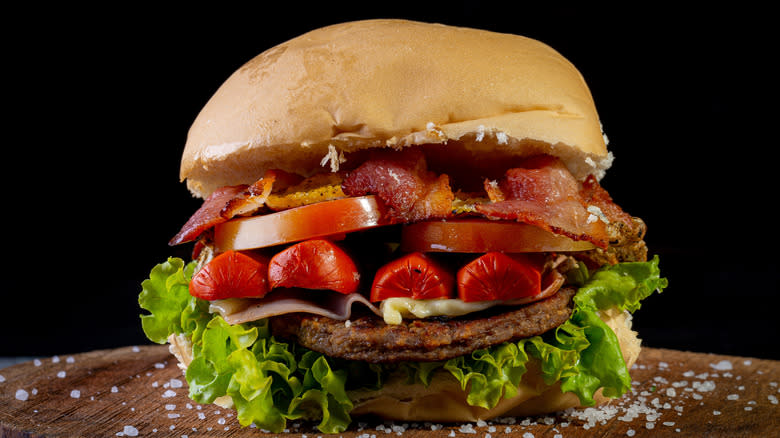
Brazil has a reputation for living large. Not only is it the fifth largest country in the world, but it also boasts achievements such as hosting the most famous and largest carnival celebration and clinching five FIFA World Cups. With such grandeur, it's no surprise that Brazil's interpretation of the burger is nothing short of spectacular.
Its name? The X-Tudo. Before we continue, a quick note on the name: The X is pronounced like "cheese" in English, and tudo translates to "everything." So, together, it's the cheese everything burger. An apt name, considering the beef patties are adorned with mozzarella cheese, corn kernels, a slice of ham, bacon, a fried egg, and shoestring potatoes. And, of course, it includes all the classic burger elements like lettuce, tomato, and sauces. This towering wonder is guaranteed to leave you with messy hands, but it's an experience you won't soon forget.
Static Media owns and operates Tasting Table, Mashed, and The Daily Meal.
Read the original article on Tasting Table.